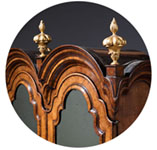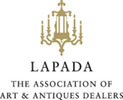17th Century William and Mary Eight-Day burl Elm Floral Marquetry Longcase Clock
Sold
Follow Us
17th Century William and Mary Eight-Day burl Elm Floral Marquetry Longcase Clock
A superb William and Mary eight-day burl elm floral marquetry longcase clock by Henry Godfrey London, c. 1695-1700.
The outstanding burl elm case is of the highest quality and decorated throughout in very attractive floral and leaf marquetry depicting abundant flower images, birds and green men, shown in shaped inlaid panels against the ebony ground with a glazed circular lenticle in an ebonised surround to the door. The sides have burr-elm panels framed in ebony line inlays. The trunk door has ebonised D-shaped mouldings, reflecting the ebonised mouldings and pillars on the hood and elsewhere. Similarly, the formerly rising hood is decorated with blind frets around the top and floral marquetry on the door. It is flanked by ebonised brass-capped plain columns, with viewing windows to the sides. The whole has an extremely warm patina.
The Green Man is a legendary being primarily interpreted as a symbol of rebirth, representing the cycle of new growth that occurs every spring. The Green Man is most commonly depicted in sculpture or other representations of a face which is made of or completely surrounded by leaves.
The eight-day five pillar movement has going and striking trains, the striking train being regulated by an inside countwheel. The going train has anchor escapement and a seconds pendulum. The movement is fronted by an 11-inch brass dial with a silvered chapter ring, seconds ring and date aperture surrounded by scroll engravings. The chapter ring is divided into Roman hour numerals as well as quarter-hour, half-hour, Arabic five-minute and minute divisions. It has elaborate cherub-head spandrels in the corners and is signed along the bottom of the chapter ring Hen Godfrey London. The middle is finely matted, whilst the time is indicated by a fine pair of richly pierced period blued-steel hands.
The maker
Henry Godfrey was born the son of George Godfrey, yeoman of Hilland, Berkshire. He was apprenticed to John Quelch (of whom we have a lantern clock in our collection) of Oxford until 1684, but only made free a year later in London. He and his wife Hester had a daughter Elizabeth in 1692 who apparently did not live long as in 1699 they again had a daughter, also called Hester. He was active as a clockmaker ‘over against St Clements’s church in the Strand’. He was buried at St Dunstan’s in the East in 1705. Longcase clocks and watches by his hand are known.
It should be noted that burr elm cases from the 17th century are extremely rare as are the sunflowers and green men depicted in the marquetry. The case is also extremely well patinated and of very good colour.
Condition
Good. Wear consistent with age and use.
Dimensions
Height: 209 cm (82.29 in)
Width: 46 cm (18.12 in)
Depth: 23.5 cm (9.26 in)
PREVIOUSLY SOLD
No Results Found
The page you requested could not be found. Try refining your search, or use the navigation above to locate the post.
No Results Found
The page you requested could not be found. Try refining your search, or use the navigation above to locate the post.
YOU MAY ALSO LIKE
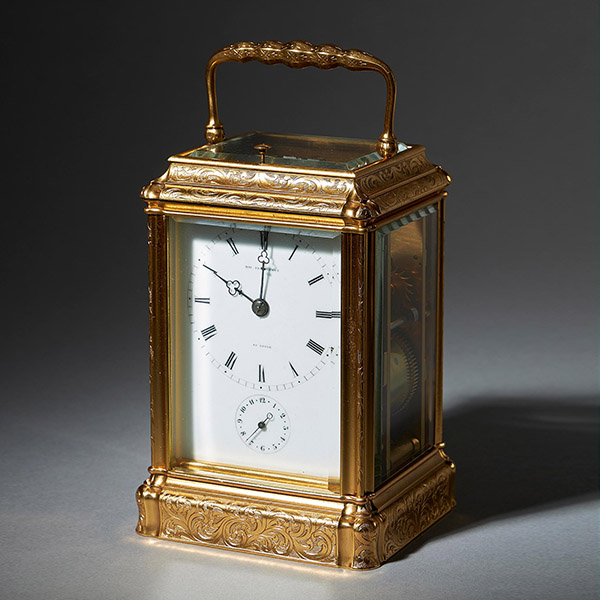
Engraved Eight-Day Striking and Repeating Carriage Clock by Perregaux Au Locle
Engraved Eight-Day Striking and Repeating Carriage Clock by Perregaux Au Locle Follow UsEngraved Eight-Day Striking and Repeating Carriage Clock by Perregaux Au Locle The superb engraved gilt gorge brass case has facetted glass panels to all...
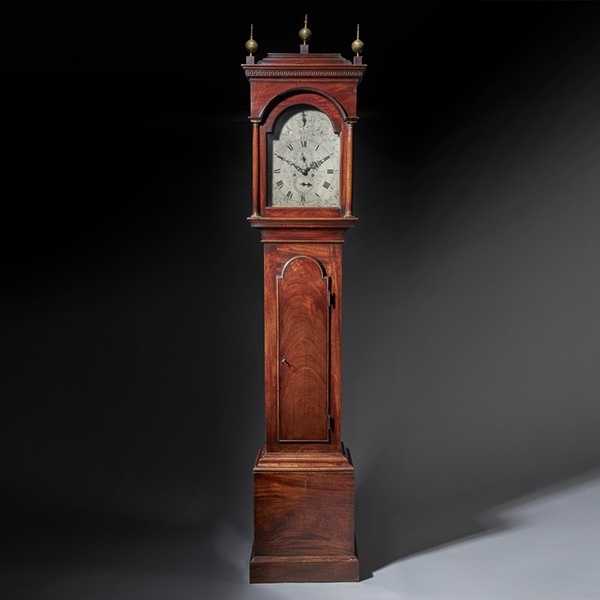
Fine George III 18th Century Period Mahogany Longcase Clock by Tomas Fowle
18th Century Period Mahogany Longcase Clock by Tomas Fowle £12,995 Follow Us18th Century Period Mahogany Longcase Clock by Tomas Fowle A fine George III period mahogany longcase clock of excellent colour, patination and proportions, circa...
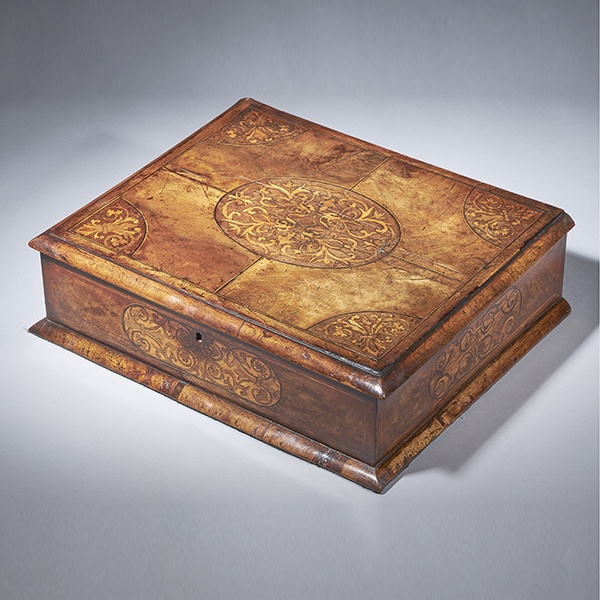
17th Century Figured Walnut and Seaweed Marquetry Lace Box
17th Century Figured Walnut and Seaweed Marquetry Lace Box £3,600 Follow Us17th Century Figured Walnut and Seaweed Marquetry Lace Box A fine and extremely rare figured walnut and seaweed marquetry 'lace box', circa.... let’s break it down -...
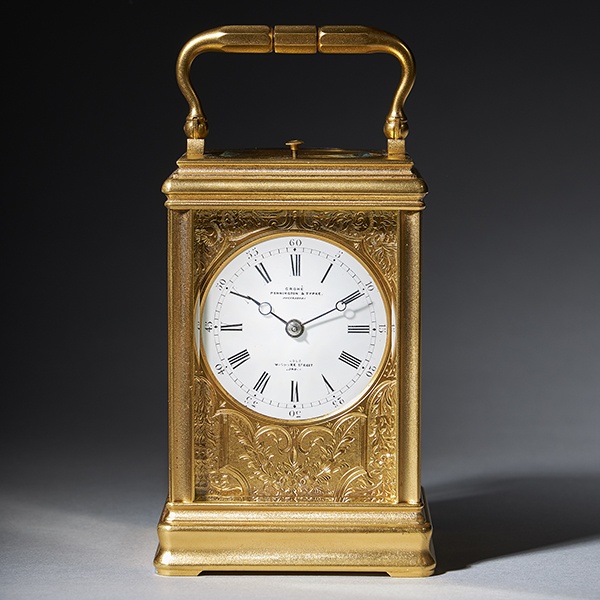
19th Century Repeating Gilt-Brass Carriage Clock by the Famous Drocourt
19th Century Repeating Gilt-Brass Carriage Clock by the Famous Drocourt £5,600 Follow Us19th Century Repeating Gilt-Brass Carriage Clock by the Famous Drocourt A superb repeating carriage clock with a gilt-brass gorge case by the famous maker...
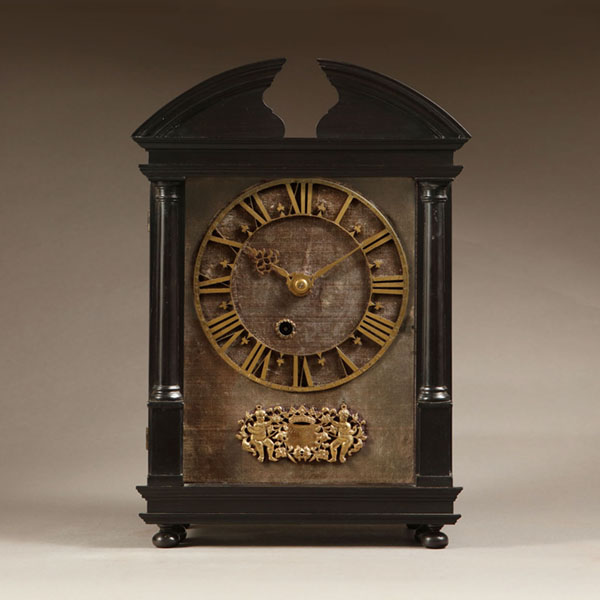
17th-Century Hague Clock Signed by Pieter Visbagh, circa 1675
Small 17th Century Hague clock made c. 1675 by Pieter Visbagh, who was apprenticed by Salomon Coster. The latter made the first pendulum clock according to the instructions of Christiaan Huygens, the internationally renowned scientist who developed the idea of applying a pendulum to a clock movement.
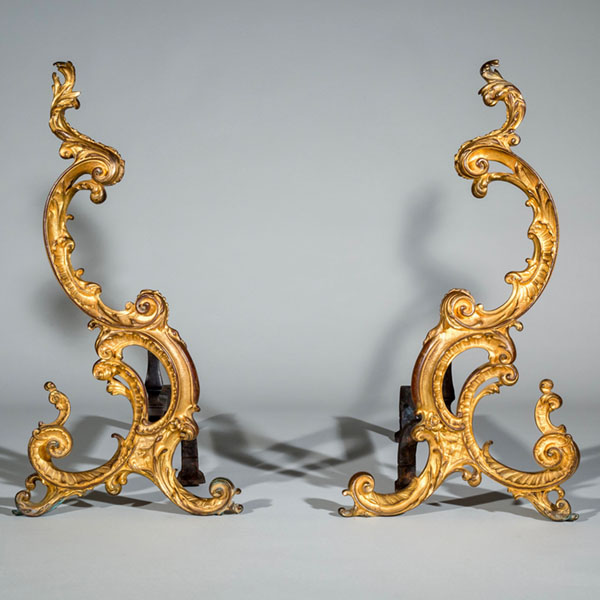
Pair of 18th-Century English Rococo Gilt Bronze Andirons or Firedogs
An exceptional pair of 18th century English Rococo gilt bronze andirons or fire dogs.
The bold shape of these andirons relate to designs of Thomas Johnson (1714–1778), one of London’s pioneers of the ‘Modern’ or French style, later known as Rococo.

Engraved Eight-Day Striking and Repeating Carriage Clock by Perregaux Au Locle
Engraved Eight-Day Striking and Repeating Carriage Clock by Perregaux Au Locle Follow UsEngraved Eight-Day Striking and Repeating Carriage Clock by Perregaux Au Locle The superb engraved gilt gorge brass case has facetted glass panels to all...

Fine George III 18th Century Period Mahogany Longcase Clock by Tomas Fowle
18th Century Period Mahogany Longcase Clock by Tomas Fowle £12,995 Follow Us18th Century Period Mahogany Longcase Clock by Tomas Fowle A fine George III period mahogany longcase clock of excellent colour, patination and proportions, circa...

17th Century Figured Walnut and Seaweed Marquetry Lace Box
17th Century Figured Walnut and Seaweed Marquetry Lace Box £3,600 Follow Us17th Century Figured Walnut and Seaweed Marquetry Lace Box A fine and extremely rare figured walnut and seaweed marquetry 'lace box', circa.... let’s break it down -...

19th Century Repeating Gilt-Brass Carriage Clock by the Famous Drocourt
19th Century Repeating Gilt-Brass Carriage Clock by the Famous Drocourt £5,600 Follow Us19th Century Repeating Gilt-Brass Carriage Clock by the Famous Drocourt A superb repeating carriage clock with a gilt-brass gorge case by the famous maker...

17th-Century Hague Clock Signed by Pieter Visbagh, circa 1675
Small 17th Century Hague clock made c. 1675 by Pieter Visbagh, who was apprenticed by Salomon Coster. The latter made the first pendulum clock according to the instructions of Christiaan Huygens, the internationally renowned scientist who developed the idea of applying a pendulum to a clock movement.

Pair of 18th-Century English Rococo Gilt Bronze Andirons or Firedogs
An exceptional pair of 18th century English Rococo gilt bronze andirons or fire dogs.
The bold shape of these andirons relate to designs of Thomas Johnson (1714–1778), one of London’s pioneers of the ‘Modern’ or French style, later known as Rococo.
